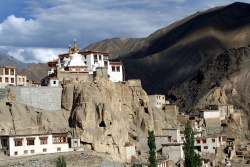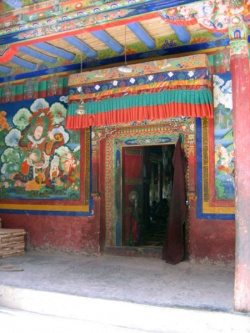Difference between revisions of "Lamayuru Monastery"
m (1 revision: Robo text replace 30 sept) |
|||
| Line 1: | Line 1: | ||
[[File:Lamayuru_Gompa_from_west.jpg|thumb|250px|]] | [[File:Lamayuru_Gompa_from_west.jpg|thumb|250px|]] | ||
[[File:Lamayurugate.jpg|thumb|250px|]] | [[File:Lamayurugate.jpg|thumb|250px|]] | ||
| − | Lamayuru or Yuru Gompa (Tibetan alphabet: བླ་མ་གཡུང་དྲུང་དགོན་པ་, Wylie: bla ma gyung drung dgon pa, Urdu:لمیرو گومپا) is a [[Tibetan Buddhist]] Gompa ([[Monastery]]) in Kargil District, Western Ladakh, [[India]], situated on the Srinagar - Kargil - Leh road 15 km east of the Fotu La, at a height of 3,510 m. | + | |
| + | |||
| + | |||
| + | [[Lamayuru]] or [[Yuru Gompa]] ([[Tibetan alphabet]]: {{BigTibetan|[[བླ་མ་གཡུང་དྲུང་དགོན་པ་]]}}, [[Wylie]]: [[bla ma gyung drung dgon pa]], {{Wiki|Urdu}}:[[لمیرو گومپا]]) is a [[Tibetan Buddhist]] [[Gompa]] ([[Monastery]]) in [[Kargil]] District, [[Western]] [[Ladakh]], [[India]], situated on the [[Srinagar]] - [[Kargil]] - [[Leh]] road 15 km [[east]] of the Fotu La, at a height of 3,510 m. | ||
| + | |||
==History== | ==History== | ||
| − | |||
| − | The Indian scholar Mahasiddhacarya [[Naropa]] (956-1041 CE), allegedly caused a lake which filled the valley to dry up and founded Lamayuru [[Monastery]]. The oldest surviving building at Lamayuru is a temple called Seng-ge-sgang, at the southern end of the Lamayuru rock, which is attributed to the famous builder-[[Monk]] [[Rinchen Zangpo]] (958-1055 CE). [[Rinchen Zangpo]] was charged by the king of Ladakh to build 108 gompas, and certainly many gompas in Ladakh, Spiti and the surrounding regions, date from his [[Time]]. | + | A. H. Francke states that, "according to popular [[tradition]]," it was originally the foremost [[Bonpo]] [[Monastery]] in [[Ladakh]] and was called [[gYung-drung]] [[Monastery]] (from [[Tibetan]]: [[gYung-drung - a]] [[Swastika]] - a popular [[Symbol]] in [[Bon]], [[Buddhism]], and other [[religions]]); also gYung-drung-[[Bon]] is the [[Name]] of the [[Bon]] [[Religion]]. |
| + | |||
| + | The [[Indian scholar]] [[Mahasiddhacarya]] [[Naropa]] (956-1041 CE), allegedly [[caused]] a lake which filled the valley to dry up and founded [[Lamayuru]] [[Monastery]]. | ||
| + | |||
| + | The oldest surviving building at [[Lamayuru]] is a [[temple]] called [[Seng-ge-sgang]], at the southern end of the [[Lamayuru]] rock, which is attributed to the famous builder-[[Monk]] [[Rinchen Zangpo]] (958-1055 CE). | ||
| + | |||
| + | [[Rinchen Zangpo]] was charged by the [[king]] of [[Ladakh]] [[to build]] [[108]] [[gompas]], and certainly many [[gompas]] in [[Ladakh]], [[Spiti]] and the surrounding regions, date from his [[Time]]. | ||
| + | |||
| + | |||
| + | : "The oldest [[gompas]], those dating from [[Rinchen-zang-po's]] [[Time]] — [[Alchi]] and [[Lamayuru]], and the less accessible [[Wanla]], [[Mang-gyu]] and [[Sumda]] — belonged at the [[Time]] of their foundation to none of these [[Tibetan schools]], whose establishment they antedate. | ||
| − | + | They were at some stage taken over by the [[Ka-dam-pa]], and when it fell into {{Wiki|decline}} they were taken over again, this [[Time]] mostly by the [[Ge-lugs-pa]]. The exception was [[Lamayuru]], which was for some [[reason]] claimed by the [[Dri-gung-pa]]" | |
| − | The gompa consisted originally of five buildings, and some remains of the four corner buildings can still be seen. | + | The [[gompa]] consisted originally of five buildings, and some remains of the four corner buildings can still be seen. |
| − | Lamayuru is one of the largest and oldest gompas in Ladakh, with a population of around 150 permanent [[Monks]] resident. | + | [[Lamayuru]] is one of the largest and oldest [[gompas]] in [[Ladakh]], with a population of around 150 [[permanent]] [[Monks]] resident. |
| − | It has, in the past, housed up to 400 [[Monks]], many of which are now based in gompas in surrounding villages. Lamayuru is host to two annual masked dance festivals, in the second and fifth months of the Tibetan lunar | + | It has, in the {{Wiki|past}}, housed up to 400 [[Monks]], many of which are now based in [[gompas]] in surrounding villages. [[Lamayuru]] is host to two annual [[masked dance]] {{Wiki|festivals}}, in the second and fifth months of the [[Tibetan lunar Calendar]], when all the [[Monks]] from these surrounding [[gompas]] [[gather]] together to pray. |
Nearby is [[Wanla Monastery]]. | Nearby is [[Wanla Monastery]]. | ||
Latest revision as of 04:26, 12 December 2020
Lamayuru or Yuru Gompa (Tibetan alphabet: བླ་མ་གཡུང་དྲུང་དགོན་པ་, Wylie: bla ma gyung drung dgon pa, Urdu:لمیرو گومپا) is a Tibetan Buddhist Gompa (Monastery) in Kargil District, Western Ladakh, India, situated on the Srinagar - Kargil - Leh road 15 km east of the Fotu La, at a height of 3,510 m.
History
A. H. Francke states that, "according to popular tradition," it was originally the foremost Bonpo Monastery in Ladakh and was called gYung-drung Monastery (from Tibetan: gYung-drung - a Swastika - a popular Symbol in Bon, Buddhism, and other religions); also gYung-drung-Bon is the Name of the Bon Religion.
The Indian scholar Mahasiddhacarya Naropa (956-1041 CE), allegedly caused a lake which filled the valley to dry up and founded Lamayuru Monastery.
The oldest surviving building at Lamayuru is a temple called Seng-ge-sgang, at the southern end of the Lamayuru rock, which is attributed to the famous builder-Monk Rinchen Zangpo (958-1055 CE).
Rinchen Zangpo was charged by the king of Ladakh to build 108 gompas, and certainly many gompas in Ladakh, Spiti and the surrounding regions, date from his Time.
- "The oldest gompas, those dating from Rinchen-zang-po's Time — Alchi and Lamayuru, and the less accessible Wanla, Mang-gyu and Sumda — belonged at the Time of their foundation to none of these Tibetan schools, whose establishment they antedate.
They were at some stage taken over by the Ka-dam-pa, and when it fell into decline they were taken over again, this Time mostly by the Ge-lugs-pa. The exception was Lamayuru, which was for some reason claimed by the Dri-gung-pa"
The gompa consisted originally of five buildings, and some remains of the four corner buildings can still be seen.
Lamayuru is one of the largest and oldest gompas in Ladakh, with a population of around 150 permanent Monks resident.
It has, in the past, housed up to 400 Monks, many of which are now based in gompas in surrounding villages. Lamayuru is host to two annual masked dance festivals, in the second and fifth months of the Tibetan lunar Calendar, when all the Monks from these surrounding gompas gather together to pray.
Nearby is Wanla Monastery.

